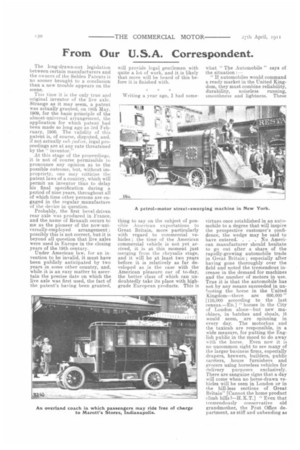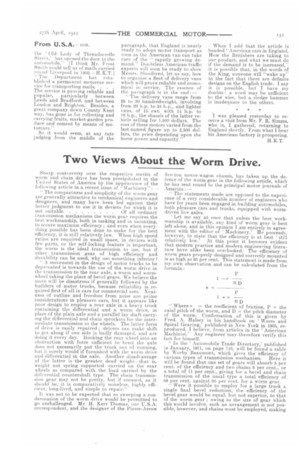From Our U.S.A. Correspondent.
Page 4

Page 5

If you've noticed an error in this article please click here to report it so we can fix it.
The long-drawn-out legislation between certain manufacturers and the owners of the Selden Patents is no sooner brought to a conclusion than a new trouble appears on the scene.
This time it is the only true and original inventor of the live axle. Strange as it may seem, a patent was actually granted, on 18th May, 1909, for the basic principle of the almost-universal arrangement, the application for which patent had been made so long ago as 3rd February, 1900. The validity of this patent is, of course, disputed, and, if not actually sub jud ice, legal proceedings are at any rate threatened by the "inventor."
At this stage of the proceedings, it is not of course permissible to pronounce any opinion as to the possible outcome, but, without impropriety, one may criticise the patent laws of a country, which will permit an inventor thus to delay his final specification during a. period of nine years, throughout all of which time other persons are engaged in the regular manufacture of the device in question.
Probably, the first bevel-driven rear axle was produced in France, and the name of Renault occurs to me as the pioneer of the now-universally-employed arrangement.; possibly this is not correct, but it is beyond all question that live axles were used in Europe in the closing years of the 19th century.
Under American law, for an invention to be invalid, it must have been publicly anticipated by two years in some other country, and, while it is an easy matter to ascertain the precise date on which the live axle was first used, the fact of the patent's having been granted, will provide legal gentlemen with quite a lot of work, and it is likely that more will be heard of this before it. is finished with.
Writing a year ago, I had some thing to say on the subject of possible American exportations to Great Britain, more particularly with regard to commercial vehicles ; the time of the American commercial vehicle is not yet arrived, it is at this moment just merging from the chrysalis stage, and it will be at least two years before it is relatively as far developed as is the case with the American pleasure car of to-day, the better class of which can undoubtedly take its place with highgrade European products. This is what " The Automobile " says of the situation :— "If automobiles would command a ready market in the United Kingdom, they must combine reliability, durability, noiseless running, smoothness and lightness. These virtues once established in an automobile to a degree that will inspire the prospective customer's confidence, the wedge may be said to have entered. . . . No American manufacturer should hesitate to go out after a share of the rapidly-growing automobile trade in Great Britain ; especially after having gone thoroughly over the field and noted the tremendous increase in the demand for machines and the number of motors in use. True it is that the automobile has not by any means succeeded in unfooting the horse in the United Kingdom—there are 600,000" 1110,000 according to the last census.—En.] "horses in the City of London alone—but new machines, in batches and shoals, it would seem, are spinning in every day. The motorbus and the taxicab are responsible, in a wide measure, for putting the Eng • lish public in the mood to do away with the horse. Even now it is no uncommon sight to see many of the larger business firms, especially drapers, brewers, builders, public carriers, .house furnishers and grocers using hors eless vehicles for delivery purposes exclusively. There are sanguine signs that a day will come when no horse-drawn vehicles will be seen in London or in the hill-less sections of Great Britain" [Cannot the home product climb hills1—E.K.T.] "Even that tremendously conservative old grandmother, the Post Office department, as stiff and unbending as the Old Lady of Threadneedle Street,' has opened the door to the automobile.' [I think Mr. Frost Smith could tell us of mails carried round Liverpool in 1902.—H.K.T.1 The Department has esteblish.:al a permanent motorcar ser vice for transporting mails. . . The service is proving reliable and popular, particularly between Leeds and Bradford, and between London and Brighton. Besides, a great company down County Kent way, has gone in for collecting and carrying fruits, market-garden produce and cement by means of motorcars."
So it would seem, at any rate judging from the middle of the paragraph, that England is nearly ready to adopt motor transport as soon as the American van can take care of the " rapidly growing demand. Doubtless American traffic experts will soon be ready to show Messrs. Shoolbred, let us say, how to organize a fleet of delivery vans which will prove reliable and economical in service. The essence of the paragraph is in the end : — " The delivery vans range from 25 to 30 hundredweight, involving from 20 h.p. to 24 h.p., and lighter vans, of 15 cwt. with 14 h.p. to 16 h.p., the chassis of the lafter vehicle selling for 1,500 dollars. The cost of these motors varied from the last-named figure up to 2,500 dollars, the price depending upon the horse-power and capacity." When I add that the article is headed "American cars in England, I-Tow the 13ritishers are taking to our product, and what we must do if the demand is to be increased," it. is possible that, in the words of the King, someone will "wake up" to the fact that there are definite designs on the English trade. I say it is possible, butt I have my doubts : a word may be. sufficient to the wise, but a sledge hammer is inadequate to the others.
I was pleased yesterday to receive a visit from Mr. F. R. Simms, who is, I gathered, returning to England shortly. From what I hear his American factory is prospering.
H. K. T.






















